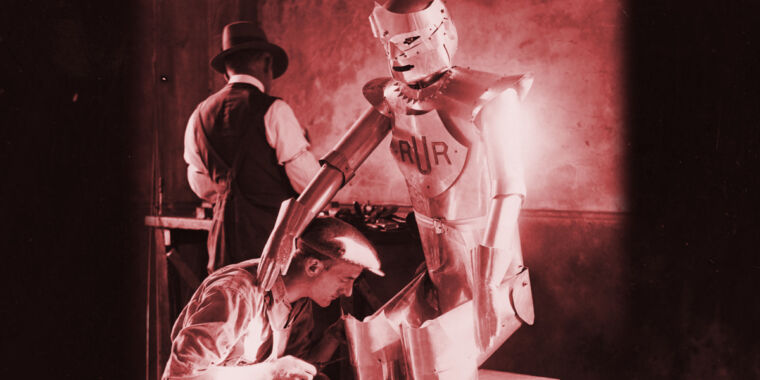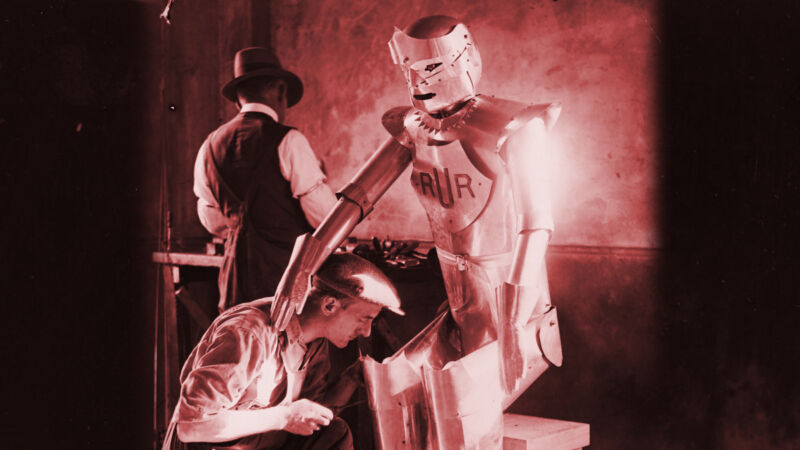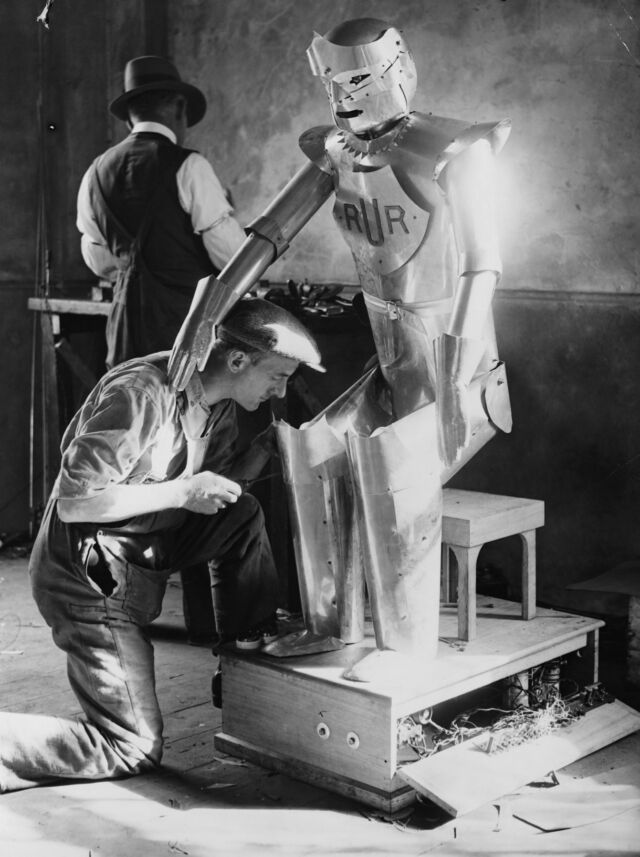

In 1921, Czech playwright Karel Čapek and his brother Josef invented the word “robotic” in a sci-fi play referred to as R.U.R. (quick for Rossum’s Common Robots). As Even Ackerman in IEEE Spectrum factors out, Čapek wasn’t completely satisfied about how the time period’s that means developed to indicate mechanical entities, straying from his authentic idea of synthetic human-like beings primarily based on chemistry.
In a newly translated column referred to as “The Writer of the Robots Defends Himself,” printed in Lidové Noviny on June 9, 1935, Čapek expresses his frustration about how his authentic imaginative and prescient for robots was being subverted. His arguments nonetheless apply to each fashionable robotics and AI. On this column, he referred to himself in the third-person:
For his robots had been not mechanisms. They had been not made from sheet steel and cogwheels. They had been not a celebration of mechanical engineering. If the creator was considering of any of the marvels of the human spirit throughout their creation, it was not of expertise, however of science. With outright horror, he refuses any accountability for the thought that machines may take the place of individuals, or that something like life, love, or riot may ever awaken of their cogwheels. He would regard this somber imaginative and prescient as an unforgivable overvaluation of mechanics or as a extreme insult to life.
This not too long ago resurfaced article comes courtesy of a brand new English translation of Čapek’s play referred to as R.U.R. and the Imaginative and prescient of Synthetic Life accompanied by 20 essays on robotics, philosophy, politics, and AI. The editor, Jitka Čejková, a professor at the Chemical Robotics Laboratory in Prague, aligns her analysis with Čapek’s authentic imaginative and prescient. She explores “chemical robots”—microparticles resembling dwelling cells—which she calls “liquid robots.”

In Čapek’s 1935 column, he clarifies that his robots had been not supposed to be mechanical marvels, however natural merchandise of recent chemistry, akin to dwelling matter. Čapek emphasizes that he did not need to glorify mechanical programs however to discover the potential of science, significantly chemistry. He refutes the concept that machines may exchange people or develop feelings and consciousness.
The creator of the robots would regard it as an act of scientific unhealthy style if he had introduced one thing to life with brass cogwheels or created life in the take a look at tube; the manner he imagined it, he created solely a brand new basis for all times, which started to behave like dwelling matter, and which may due to this fact have grow to be a car of life—however a life which stays an unimaginable and incomprehensible thriller. This life will attain its achievement solely when (with the help of appreciable inaccuracy and mysticism) the robots purchase souls. From which it’s evident that the creator did not invent his robots with the technological hubris of a mechanical engineer, however with the metaphysical humility of a spiritualist.
The explanation for the transition from chemical to mechanical in the public notion of robots is not fully clear (although Čapek does point out a Russian movie which went the mechanical route and was doubtless influential). The early 20th century was a interval of speedy industrialization and technological development that noticed the emergence of advanced equipment and digital automation, which in all probability influenced the public and scientific neighborhood’s notion of autonomous beings, main them to affiliate the concept of robots with mechanical and digital gadgets slightly than chemical creations.
The 1935 piece is filled with fascinating quotes (you’ll be able to learn the entire factor in IEEE Spectrum or right here), and we have grabbed just a few highlights under which you can conveniently share together with your robot-loving buddies to blow their minds:
- “He pronounces that his robots had been created fairly otherwise—that’s, by a chemical path”
- “He has discovered, with none nice pleasure, that real metal robots have began to look”
- “Nicely then, the creator can’t be blamed for what would possibly be referred to as the worldwide humbug over the robots.”
- “The world wanted mechanical robots, for it believes in machines greater than it believes in life; it’s fascinated extra by the marvels of expertise than by the miracle of life.”
So it appears, over 100 years later, that we have gotten it flawed all alongside. Čapek’s imaginative and prescient, rooted in chemical synthesis and the philosophical mysteries of life, provides a distinct narrative from the predominant mechanical and digital interpretation of robots we all know as we speak. However judging from what Čapek wrote, it appears like he would be firmly in opposition to AI takeover situations. In truth, Čapek, who died in 1938, in all probability would assume they might be unattainable.